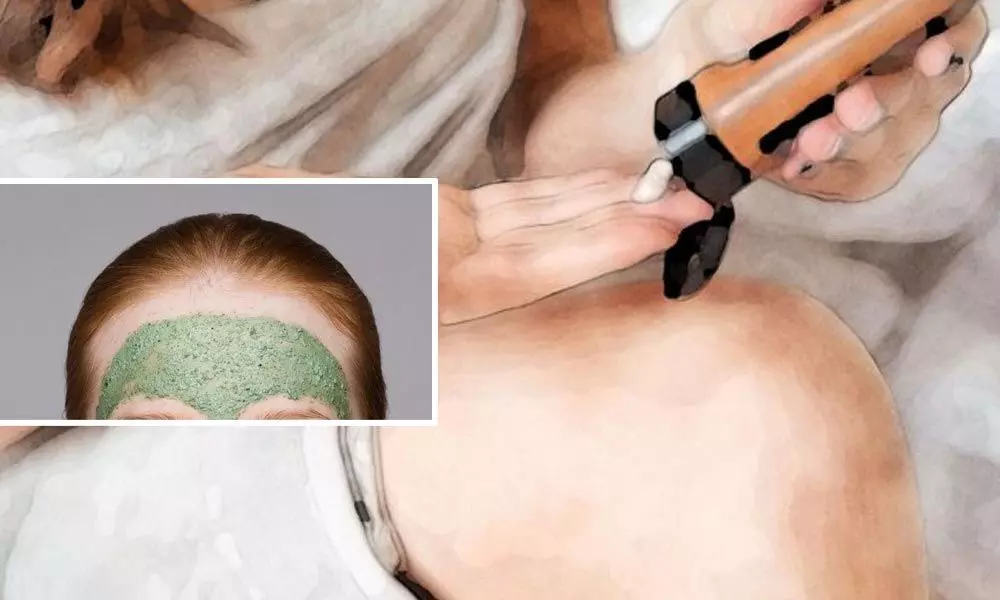Live
- PM Modi highlights govt's efforts to make Odisha prosperous and one of the fastest-growing states
- Hezbollah fires 200 rockets at northern, central Israel, injuring eight
- Allu Arjun's Family Appearance on Unstoppable with NBK Breaks Viewership Records
- Unity of hearts & minds essential for peace & progress, says J&K Lt Governor
- IPL 2025 Auction: I deserve Rs 18 cr price, says Chahal on being acquired by Punjab Kings
- EAM Jaishankar inaugurates new premises of Indian embassy in Rome
- Sailing vessel INSV Tarini embarks on second leg of expedition to New Zealand
- Over 15,000 people affected by rain-related disasters in Sri Lanka
- IPL 2025 Auction: RCB acquire Hazlewood for Rs 12.50 cr; Gujarat Titans bag Prasidh Krishna at Rs 9.5 crore
- Maharashtra result reflects the outcome of Congress' destructive politics: BJP's Shazia Ilmi
Just In
8 Remedies to Clear your skin Naturally


When it comes to good skin, there are tons of face washes and moisturizers that claim to do the trick, but not everyone can spend a pretty fortune on a trove of products.
When it comes to good skin, there are tons of face washes and moisturizers that claim to do the trick, but not everyone can spend a pretty fortune on a trove of products. Luckily, you can instead opt for what's sitting in your medicine cabinet or pantry and use home remedies for clear skin. Some natural products that you already may have at home can do the job just as well as a fancy face wash, and it can't hurt to try these solutions first, as they are natural and won't cost you a dime.
You can easily do a facial at home by using home remedies and following all the facial steps with natural products and get a natural glow on your skin with pure ease.
Here are some remedies to pamper your skin and do a facial at home:
1. Tea Tree Oil
Tea trea oil smells like a dream, and can do a lot of good for your skin. A study from the Journal of Dermatology, Venereology, and Leprology found that topical products containing 5% tea tree oil was effective at treating mild to moderate acne. Those treated with tea tree oil-infused gel were up to 5 times more likely to experience a reduction in acne than those treated with a placebo product.
"Tea tree oil contains anti-microbial properties that kill bacteria,"
2. Green Tea Extract
Green tea isn't just for drinking to get zen. It also can calm your skin. Frey says studies have shown applying products with 2% green tea extract twice a day reduced acne in adolescents with mild acne. Plus, green tea contains antioxidants that can help protect against skin issues like acne while fight against free radicals.
3. Aloe Vera
Your aloe house plant isn't just good for soothing sunburns — it can help clear up acne as well. Skin care products with high percentages of aloe as an active ingredient has been clinically proven to improve skin appearance in patients, according to dermatologists.
"A study on 60 acne patients who were also using tretinoin ( a prescription anti-acne medication) fared better when they also applied 50% aloe vera gel for eight weeks compared to those who used tretinoin alone,"
4. Honey
Honey is a humectant, which means it has properties that can help lock in skin moisture. In addition, the yummy treat can also prevent breakouts and infections from bacteria, as it also has antimicrobial and antibacterial properties, according to Livestrong.
All around honey is a pretty sweet skin care ingredient to help soothe your skin, especially when used in a moisturizing routine or as a face mask.
5. Coconut Oil
Coconut oil is known for being a great leg moisturizer, so why not apply the same philosophy to your face? But be careful — this recommendation is not one size fits all.
If you have dry skin or the conditions mentioned, you can try coconut oil to moisturize your face. If you are more sensitive, however, you might want to stick to only using it on the rest of your body where clogged pores aren't so common.
6. Castor Oil
If you want an oil with a little less risk, try castor oil. This oil, known for aiding in long, healthy hair, can also be ideal for your skin.
"Castor oil is less likely to cause blocked pores, as it can be used a gentle oil cleanser or eye make remover,"
Castor oil contains a compound called undercylenic acid, which helps to disinfect the skin and kill bacteria that cause skin conditions such as acne, says Livestrong. With both antibacterial and anti-inflammatory properties, castor oil could be your new skin care go-to.
7. Aspirin
If your skin is giving you a headache, turn to asprin for some relief. Aspirin's active ingredient, acetyl salicylic acid, has antiseptic and anti-inflammatory properties that help treat pimples, according to Medical Daily.
Applying aspirin topically can can reduce swelling, unclog pores, and even soften your skin. To apply to pimples, try crushing a capsule and adding a few drops of water to make a paste. Dip a Q-tip in to the newly created ointment and apply as needed. Easy as pie.
8. Chamomile
Here's another tea ingredient that can double as a skin care savior. Chamomile is an anti-inflammatory, antioxidant, and mild astringent, according to a review published in the Molecular Medicine Reports. Chamomile is especially used in skin care to treat inflammations of the skin through topical creams and oils.
Although most of these at-home remedies are mild, Frey cautions to test a small area of skin before applying any new to a large, sensitive area. Here's hoping one of these home remedies can help save your skin.

© 2024 Hyderabad Media House Limited/The Hans India. All rights reserved. Powered by hocalwire.com






